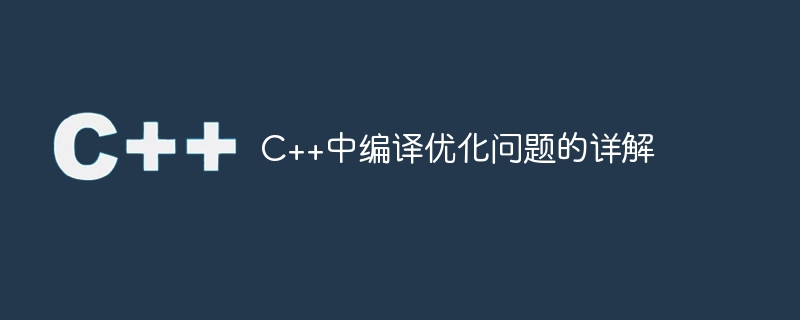

Detailed explanation of compilation optimization issues in C
Writing efficient C code is the goal pursued by every programmer, and compilation optimization is one of the important aspects. Correctly understanding and applying compilation optimizations can greatly improve the performance and efficiency of your programs. This article will start with the basic principles of C compilation optimization, common optimization techniques and specific code examples, and analyze the compilation optimization issues in C in detail.
1. Basic principles of compilation optimization
Before understanding compilation optimization, we first need to understand how the compiler works. A compiler converts high-level language code into machine code so that the computer can execute it directly. Compilation optimization is to improve the performance and efficiency of the program as much as possible by analyzing and reorganizing the code during this conversion process.
The core idea of compilation optimization is to reduce unnecessary calculations and memory accesses, and to optimize the performance of the program by reducing the complexity of the program and increasing the execution speed of the code.
2. Common compilation optimization techniques
Sample code:
int x = 10; int y = 20; int z = x + y;
Code after constant folding optimization:
int z = 30;
Sample code:
for (int i = 0; i < 10; i++) {
// do something
}Code after loop expansion optimization:
// do something 10 times
Sample code:
inline int add(int x, int y) {
return x + y;
}
int result = add(10, 20);Code optimized with inline functions:
int result = 10 + 20;
Sample code:
int x = 10; int y = 20; int z = x + y;
Code optimized after data flow analysis:
int z = 30;
3. Precautions for compilation optimization
Although compilation Optimization can improve program performance, but sometimes it may bring about some unexpected problems. When using compilation optimization, you need to pay attention to the following points:
4. Summary
Writing efficient C code requires an in-depth understanding of the principles and techniques of compilation optimization. This article starts with the basic principles of compilation optimization, common optimization techniques and precautions, and provides a detailed analysis of compilation optimization issues in C through specific code examples. Mastering compilation optimization technology can improve the execution speed and responsiveness of the program while ensuring the performance and efficiency of the code.
The above is the detailed content of Detailed explanation of compilation optimization issues in C++. For more information, please follow other related articles on the PHP Chinese website!




